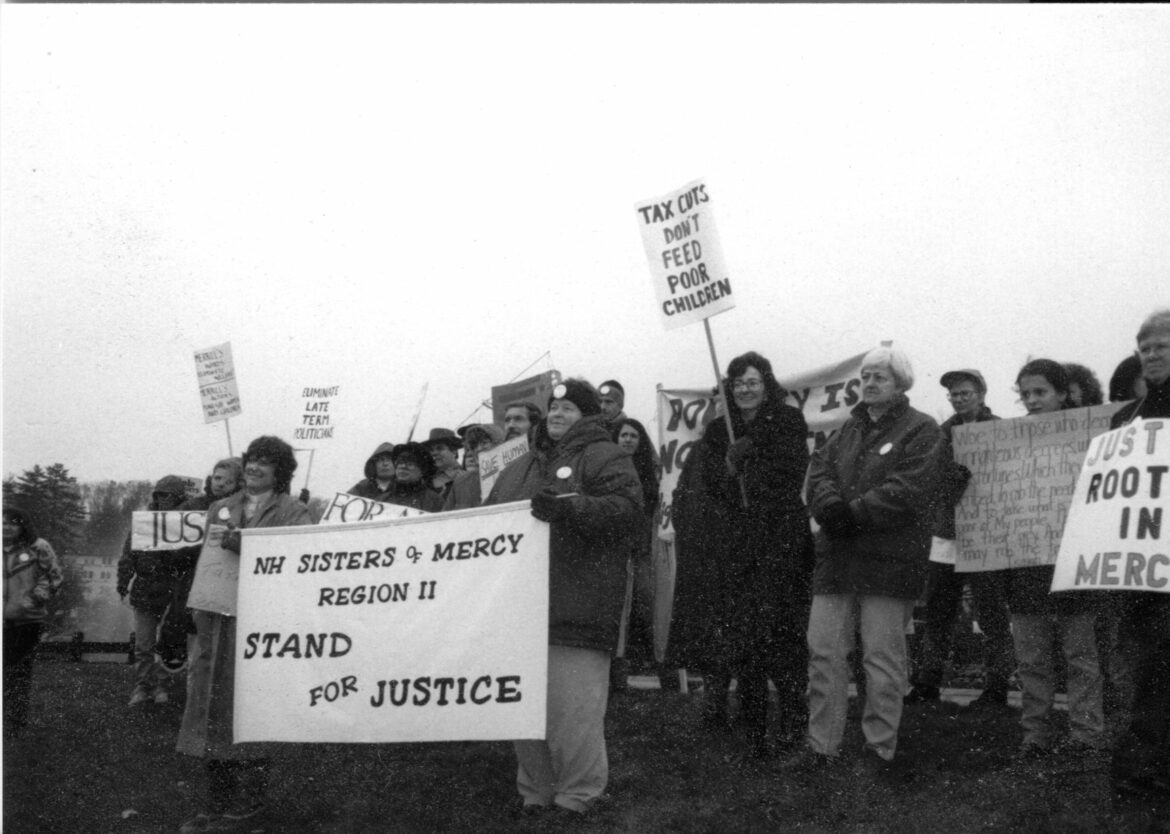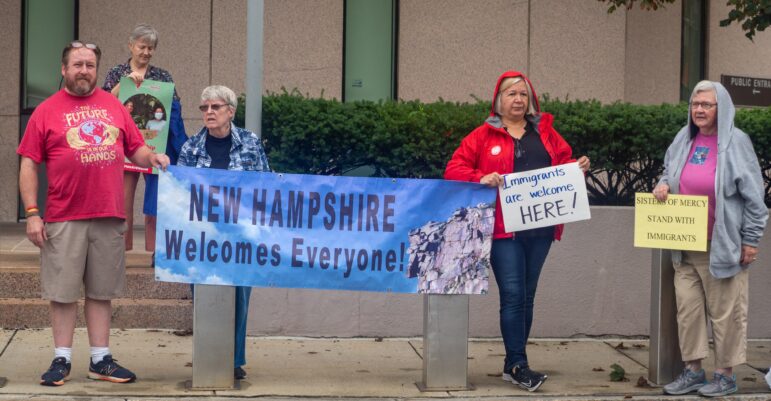
By Arnie Alpert, Active with the Activists
Arnie Alpert spent decades as a community organizer/educator in NH movements for social justice and peace. Officially retired since 2020, he keeps his hands (and feet) in the activist world while writing about past and present social movements.
Members of the Sisters of Mercy were among the first people I worked with when I became the American Friends Service Committee’s New Hampshire representative in 1981.
Sister Mary Ellen Foley was organizing opposition to U.S. support for the military dictatorship in El Salvador, where three nuns and a laywoman had been murdered by death squads the year before. Mary Sliney was raising awareness about hunger at the Rural Education Center in Wilton, a couple years before Samuel Kaymen and Gary Hirshberg launched Stonyfield Yogurt. Madonna Moran was running a study group about nuclear weapons at the Christian Life Center in Concord. Susan Colwell, a former Mercy and the group’s first associate member, was chairing the state’s Commission on the Status of Women. A religious order long dedicated to education had taken its mission out of the classroom into the community.
I already knew Sister Eileen Brady, who was active in the Clamshell Alliance and with another sister had been part of a group which was arrested after climbing a crane at the under-construction nuclear plant in Seabrook in 1978. I recently interviewed Sister Eileen on the occasion of the 165th anniversary of the arrival of the first Sisters of Mercy in New Hampshire.
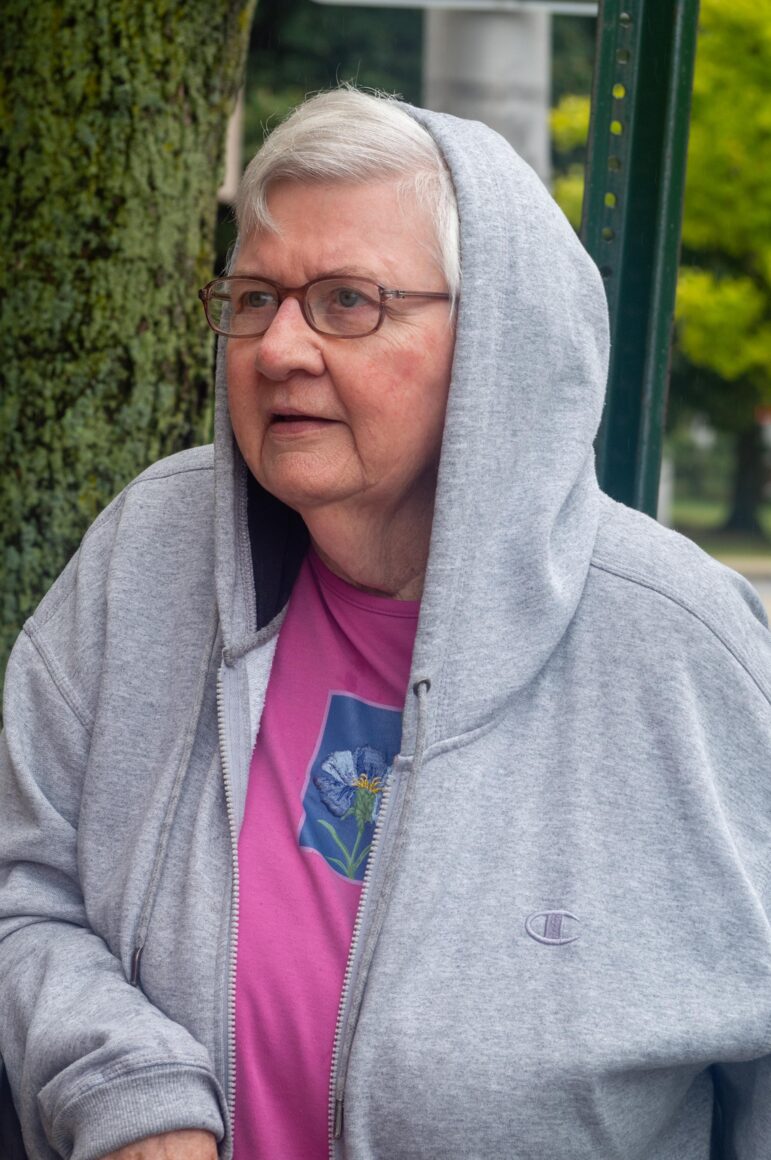
A close associate of Catherine McCauley, who founded the Sisters of Mercy in Dublin, Ireland in 1831, Frances Warde led a group of seven sisters to the United States in 1843. After her first stop in Pittsburgh, she seeded communities of Mercies in Chicago and Providence before reaching Manchester on July 16, 1858.
It was four years after anti-Irish arson attacks in Manchester. “That’s why they came,” Sister Eileen said in her typically blunt way, “because Irish immigrants were being treated pretty badly. There was a lot of religious prejudice. When the convent was first opened, the Know Nothings, the ancestors of the Trumpers, tried to burn the convent down.”
According to an official history, “When Frances and her small band of sisters arrived in Manchester, they began immediately to instruct the children, the mill workers, and others in need in this city.” People from Ireland constituted the state’s first major wave of immigrants since the English had begun displacing the region’s indigenous inhabitants in the 17th century. By 1858, Manchester had thousands of Irish residents and nativist sentiment was on the rise.
“People needed help on every level,” Sister Eileen said. Nowadays, we might call what they did “social work,” or perhaps “community organizing.”
Conditions had obviously changed by the middle of the 20th century when Eileen was growing up. “No Irish Need Apply” signs had not been seen for decades. The Catholic community included thousands of French-speaking immigrants from Quebec and their descendants. While many NH Sisters of Mercy were of Irish descent, the community was more diverse in its own ethnic origins. But there was still hunger, poor housing, and prejudice, and the Sisters of Mercy were still addressing social needs in the state’s cities and towns.
As a student in Catholic schools, Eileen got to know lots of nuns and decided to become one when she was in seventh grade. It came naturally, she said, because she was so used to them. “In junior high, you kind of think, what am I gonna do with my life?” she recalled. “I was interested in doing good, like I saw them doing.”
It was the 1960s, the time of the Vatican 2 reforms in the Catholic Church. Mass started being offered in English. Nuns were allowed out of the convent and out of the habit. Sisters May Cronin and Mary Aileen Dame had gone to Latin America, where they encountered the stirrings of what would later be called “liberation theology,” which said the Church should be on the side of poor people instead of local and national elites.
Sister Bea Desmarais was Eileen’s high school biology teacher, but she also taught theology. In that class, she asked what Jesus would do about racism and civil rights if he came back. “The Union Leader hammered her for that, named her, and went after her which made most of us really like her more,” Sister Eileen said.
It wasn’t just the nuns. Father Phil Kenney was a prominent local advocate for social justice, moving into a public housing project on Manchester’s West Side, opposing the U.S. war in Vietnam, and following Dr. Martin Luther King’s call for clergy to march in Selma. He was lambasted, too, by the local newspaper, but he never cared, Sister Eileen said.
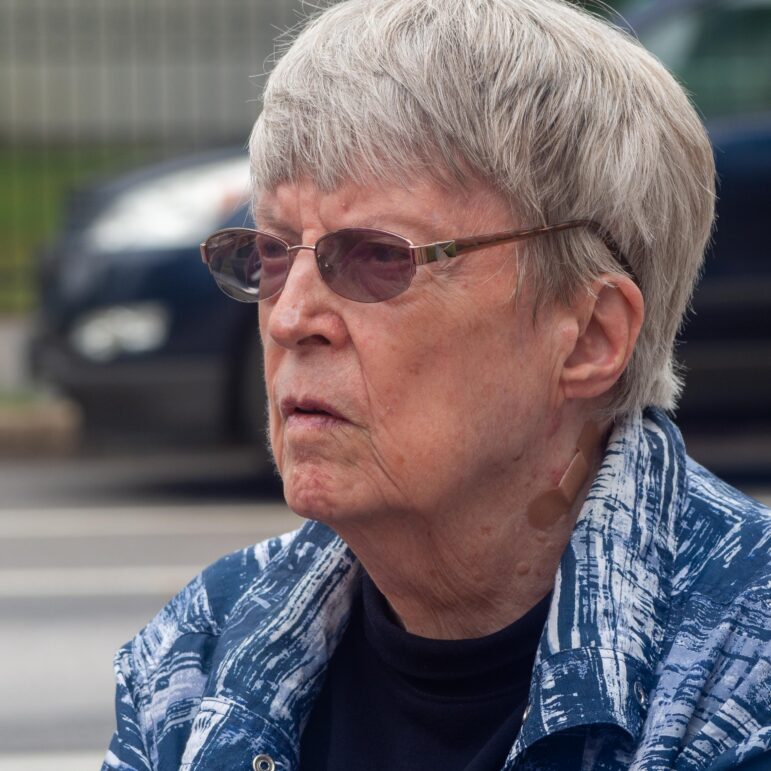
When Father Kenney suggested that some of the nuns also move to the Rock Rimmon housing project, six Sisters of Mercy rented an apartment there. (Back then, it only took 6 months to get into public housing. “Now, it’s 10 years,” Sister Eileen observed.) At Rock Rimmon, the sisters became community organizers. “We were going door to door and assessing what people would want,” said Sister Eileen, who moved to the housing project after a stint running a parish in Barrington. What the single moms wanted, she said, was access to kindergarten for their kids, something that was not guaranteed by the City. Soon, the Sisters of Mercy were running a private kindergarten at the housing project.
Sister Eleanor Mullaley, one of the Rock Rimmon residents, served as director of education at the NH State Prison in Manchester. When prisoners went on strike to demand better conditions, Sister Eleanor expressed her support. “You weren’t supposed to say that,” Sister Eileen said with a chuckle. When Sister Eleanor was fired for insubordination by Gov. Meldrim Thomson, the Sisters of Mercy once again gained notoriety in the local press.
“She would just take life on, you know, headfirst into the fray,” Sister Eileen said of her friend, who died in 2013. The fray included the controversy over a nuclear power plant under construction in Seabrook, which was backed by Gov. Thomson. Opponents included the Manchester-based Granite State Alliance (GSA), which argued the plant would be too expensive. Freed from her responsibilities at the prison, Eleanor joined the GSA staff and joined demonstrations against the “nuke.”
In 1978, two days after returning from a study trip to Mexico, Sisters Eleanor and Eileen joined several other protesters who hung a No Nukes banner from a construction crane on the Seabrook site. They were arrested, but later had charges dropped. The local committee of the Clamshell Alliance, which led the Seabrook protests, included several others who had been students of Bea Desmarais, Sister Eileen said.
“Sisterhood is powerful” could have been a slogan of the Mercies, who were in many ways ahead of 1970s feminism. With role models like Sister Bea, they already knew what it was like to go out on a limb. They also knew what it meant to be part of a supportive community. Looking back, I realize I should not have been surprised when Sister Madonna took the mic at an early ‘80s Take Back the Night rally in Concord.
Sister Eileen cited, too, the example of Theresa Kane, a Sister of Mercy who was the only woman chosen to greet Pope John Paul II during his 1979 visit to the United States. Her public statement that women should be “included in all the ministries of our Church” was a direct challenge to the conservative pope and Catholic patriarchy. Sister Theresa, at the time the head of the Leadership Conference of Women Religious, delivered her message in a gentle way, Sister Eileen said, but Pope John Paul II was furious. “And Sisters of Mercy afterwards got in lots of trouble,” Sister Eileen remembered.
Rifts within the Church were reflected within the NH Sisters of Mercy, in which some members held to the old ways. “The more conservative people wanted everybody to stay in schools, stay in the habit, stay in convents,” Sister Eileen said. “A way of life was being threatened for them. And if we didn’t do all those things, then all hell would break loose. And it sorta’ did.”
The Seabrook arrests were “like the last straw,” she said, but the seeds had been planted at the time of Vatican 2. In the late 1970s, after two years of meetings, the NH Sisters of Mercy split into two groups. Sister Eileen was with the ones who wanted to leave the convent, use common names, dress like the people all around them, and work in the community. They rejected hierarchy and agreed their members should have a choice about where they wanted to live and work. They created their own spiritual practices, too. “I stopped going to church in ‘76 or ‘77,” Sister Eileen said.
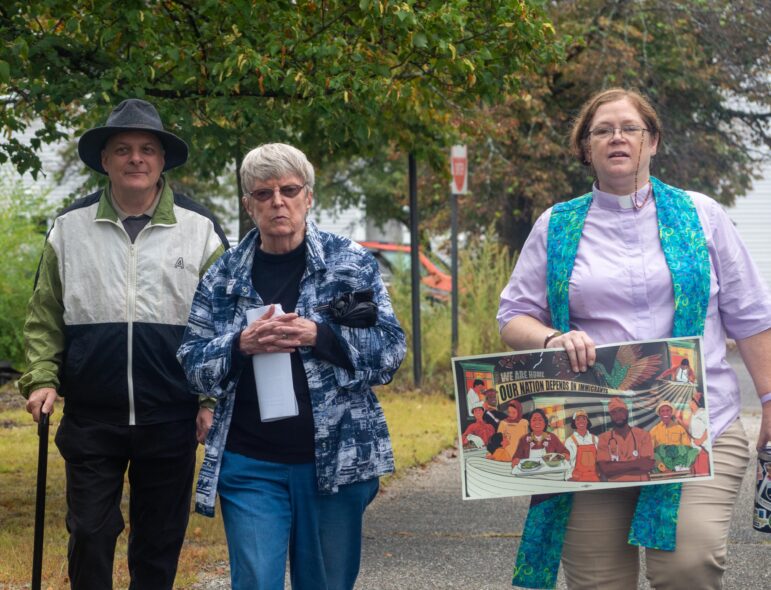
Sarah Jane Knoy has known the Sisters of Mercy since she came to Manchester in 2007 to run the Granite State Organizing Project (GSOP), an interfaith social justice group. Standing outside the Norris Cotton Federal Building in Manchester, where GSOP holds a monthly immigrant solidarity prayer vigil, she said the Mercies “helped me get acclimated to my new job.”
May Cronin was the first Sister of Mercy she got to know. “She understood power,” Knoy said, “and she was mostly at odds with the Catholic establishment. But she was really comfortable with that.”
“I don’t want to talk about myself as much as the community,” Sister Eileen said, but her own story is a good example of the Sisters of Mercy approach to community work. Eileen’s dad worked in a Manchester shoe factory and was active in the union there. Her mom, who worked for the city, sued when she lost pension benefits after taking time off to raise a family. “It was called the Brady amendment to the rules of employment,” Sister Eileen said. “If somebody had to leave for pregnancy, they could resume keeping their original years.” Her parents informed her sense of justice more than the nuns, she said.
Sister Eileen spent the final phase of her employed life as Advocacy Director for the Nashua Soup Kitchen and Shelter, an unsurprising place for a Sister of Mercy to land. After all, Sister Eileen pointed out, Sister Frances Warde took in homeless kids back in the 1800s, and housing never left their areas of concern. For example, the New Horizons soup kitchen and shelter evolved from a Winnebago lent to Sister Angie Whidden by Bob Shaw, a local businessman, in 1979. Sister Angie and other sisters parked it at the Carpenter Center and used it to distribute sandwiches.
By the early ‘80s, when homelessness was growing nationwide, Angie and New Horizons opened a shelter on Nutfield Street. “Reagan Motels and Ron’s Diners were cropping up all over the country,” Sister Eileen said. “We should call them that because he was the cause,” Sister Eileen said, recalling a president infamous for cuts in safety net programs. “Part of the cause, anyway, because there wasn’t marked homelessness before he got in.”
Rest assured Sister Eileen is not partisan with regard to assigning blame for widespread homelessness. Bill Clinton, too, pulled the rug out from under support systems, she said.
In Nashua, Sister Eileen set to work building support for the support systems people needed. She made it a point to get to know all the community’s elected officials. She started a Facebook page for advocacy. She went to Concord, repeatedly, to testify at hearings. She went to Chamber of Commerce meetings, too, and developed relationships with local business leaders.
When the Chamber of Commerce hosted State Senators Jeb Bradley, a Republican, and Cindy Rosenwald, a Democrat, to talk about expanding Medicaid under the Affordable Care Act, Sister Eileen was there to back the idea. Later, the head of the Chamber would testify at the State House why expanded Medicaid would be a good thing. Sister Eileen remembers one man who used the program to get a knee replaced and return to work. “I said, Oh, this is a wonderful story for the politicians.”
Another story she related concerned a woman whose son was acting strangely and getting nowhere with local caregivers. Sister Eileen encouraged her to take her son to Boston Children’s Hospital, where they found and treated a brain tumor. “Now she has a business,” Sister Eileen said, proudly.
Sister Eileen retired from Nashua Soup after 23 years, when she turned 70. Now 76, she’s on the younger edge of the remaining 57 Sisters of Mercy in New Hampshire. Too old, perhaps, to climb construction cranes, they continue to express their concerns about justice by writing letters and occasionally attending protests. Mostly, though, they express their concern by taking care of each other.
“Even though we’re going extinct, we’re not concerned about that as our priority,” Sister Eileen told me, “but we are concerned about what kind of legacy we leave.” The legacy is in the uncounted lives they have touched, especially as teachers. “I’m not worried about what people will say about us, but the things that we were most concerned about, like poor people, immigrants, historically that never changed.” From the time Frances Warde came to Manchester 165 years ago, the Sisters of Mercy have been “refusing to be indifferent to anyone in need,” as a recent message to members put it.
It was no surprise to find Sisters Eileen and Mary Ellen at the monthly Immigrant Solidarity Prayer Vigil in September. After a short prayer session led by Rev. Jonathan Hopkins, Sister Eileen stood on the sidewalk by Chestnut Street with a sign saying, “Sisters of Mercy Stand with Immigrants.” Mary Ellen, who is 87 years old, made one circuit around the block with the “Jericho Walk,” then joined Sister Eileen. Together we discussed their work with immigrants, which began with the arrival of the first Sisters of Mercy in Manchester 165 years earlier.
In the current century, the Sisters of Mercy have been providing English and citizenship classes to immigrants based out of local churches and offices. Sister Mary Ellen remembered one former student, a Sudanese man named James who was heartbroken because his village had no water. Sister Anastasia Smith, one of the teachers, said they’d see what they could do. After a year of fundraising, including hitting up Sister Anastasia’s former Catholic school students for donations, they had enough money to install wells in two villages. “Two different villages have water because Anastasia said, ‘We can do that,’” Sister Mary Ellen said.
Sister Mary Ellen was the sparkplug behind the Mercy’s decision to join the Sanctuary Movement, which was a moral challenge to the Reagan Administration’s support for repressive governments in Guatemala and El Salvador in the 1980s. “We took a whole year of study,” Sister Mary Ellen said, “and on December 27, 1984, we declared a public sanctuary,” the first community of nuns to do so. Following their declaration, a Salvadoran man, a Guatemalan woman, and their three children moved into their home on Union Street, where they lived for about a year.
Sister Mary Ellen hit the road to talk about sanctuary, visiting Chicago, New York, Albuquerque, San Francisco, and Los Angeles. She still gets animated when she talks about the thousands of people who are still fleeing from violence in Latin America and being turned away by the United States. “We’re in a period now where we have to step it up, the pressure on our elected officials, and others, because this is so out of hand and so outrageous,” she said. With presidential candidates talking openly about killing people at the border, “it just tells us we have more work to do.”
Eva Castillo of the NH Alliance for Immigrants and Refugees stood with Sisters Mary Ellen and Eileen in front of the Federal Building during the Solidarity Vigil. She started working with the Sisters of Mercy when her own attention shifted from providing immigrants with services to advocacy. “They are amazing,” she said. “They have so much energy. They’re compassionate. They’re true egalitarians. They treat everybody with respect regardless of where they come from, what they sound like, or who they love. I wish all the Catholic church teachings were applied the way they apply them.”
